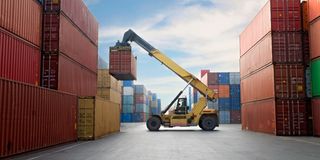Winners, losers in illegal 15 per cent VAT on imports

What you need to know:
The appellants may obtain a court order directing the URA to refund the tax which was collected illegally from each individual taxpayer. The Court order would be served to the URA legal department to coordinate the refund, Harriet Nakaddu writes.
The Domestic Value Added Tax (VAT) of 15 per cent on the value of imports declared by non-VAT registered persons was recently declared illegal by the Court of Appeal because it was not imposed by any Act of Parliament. The court further awarded a refund for the domestic VAT that was collected illegally to the affected taxpayers plus interest accruing at the court rate from the date of collection up to the date of the refund.
The URA was charging and collecting the VAT at the time when a non-VAT registered taxpayer declared their imports for customs purposes and yet the tax was not imposed by either the East African Customs Management Act or the VAT Act.
In its defence, the URA argued that the Domestic VAT was assessed on the importers as an administrative convenience measure of collecting future possible output VAT from the importers because the importers were unlikely to file VAT returns and pay the output VAT when they sell the goods in future.
Nevertheless, the Court of appeal agreed with the importers that the 15% domestic VAT was illegal because it was contrary to Article 152(1) of the Constitution.
The judgement is a great win for the non-VAT registered importers in that, going forward, the URA will have to stop any further collection of the domestic VAT on their imports unless the Court of Appeal’s position is overturned by the Supreme Court. Furthermore, the taxpayers that paid the 15 per cent Domestic VAT are now entitled to a refund of the illegal VAT that was collected from them plus simple interest that has accrued on the tax paid illegally at the court rate.
The URA is yet to respond to the position taken by court. However, the question remains: Will URA concede to this judgement given the significant implications with regards to refunding of back taxes as well as stopping the collection of domestic VAT on imports going forward?Options for traders
In the meantime, what options do the affected taxpayers have at this stage?
-The 13,946 appellants may consider obtaining a court order directing the URA to refund the tax which was collected illegally from each individual taxpayer. The Court order would be served to the URA legal department to coordinate the refund.
-The affected taxpayers may also submit a claim for a tax refund for the tax that was collected illegally based on the premise that the 15 per cent domestic VAT falls outside the scope of the VAT Act. Considering that court has deemed this tax as having been illegally imposed and collected, the refund guidelines contained in the VAT Act do not specifically cater for this kind of situation. The taxpayers may, therefore, have to engage the URA on the best/most practical manner of obtaining the refund.
-The affected taxpayers who got registered for VAT subsequently and those who would like to obtain a refund in accordance with the VAT Act, will be required to follow the process of claiming a VAT refund in the VAT Act. In this case, the taxpayer will have to register for VAT (if not yet registered) and submit a VAT return selecting the refund option for the overpaid tax.
For either option, the URA will have to verify the amount which was collected illegally from each person in order to determine the amount refundable on a case by case basis.
The Commissioner General (CG) conducts an audit to verify the amount paid, which in this case will be the amount that was collected illegally. It also follows that the CG will be interested in verifying whether there was any VAT due and payable by the taxpayer based on the taxpayer’s transactions. When the CG is satisfied that amount of tax that was collected illegally from each person was in excess of the VAT that was properly due in accordance with the VAT Act, then the CG will be required to refund the excess tax paid.
Whereas URA is obliged to refund the VAT that was collected illegally, the process has to be initiated by the taxpayers. Taxpayers will need to consider the cost benefit analysis of claiming the refund bearing in mind the effort and time investment that will be required should the URA undertake a comprehensive audit as part of the refund verification process.
The actual turn up for the refund claims will be limited by the willingness of the taxpayers to undergo the refund verification process. This comes through as a win for the URA in that the URA will retain a big proportion of the tax which was collected illegally and at the same time harmonise the tax position of the taxpayers who opt to apply for the refund.
Law
Impact
The judgement is a great win for the non-VAT registered importers in that, going forward, the URA will have to stop any further collection of the domestic VAT on their imports unless the Court of Appeal’s position is overturned by the Supreme Court.
The author is the senior manager, indirect taxes, PwC Uganda.




